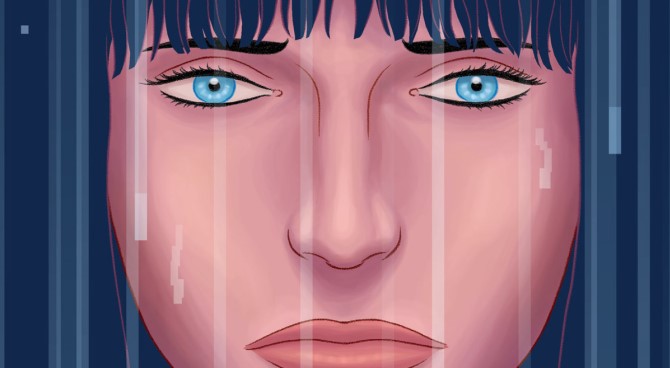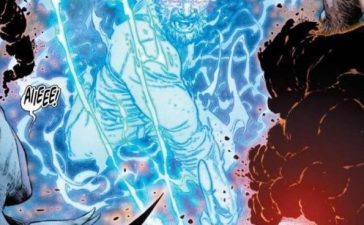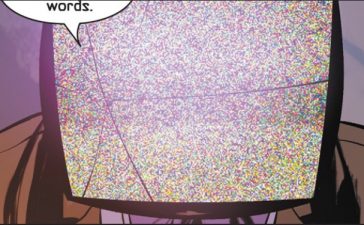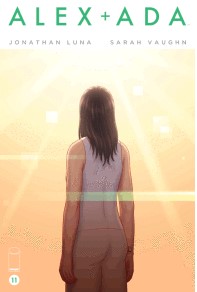 Superficially the term unconventional refers to something which is different, For example, “my friend has this really unconventional way of eating pizza.” Yet, it also has a deeper implication of defiance. Someone who chooses to be unconventional in such a way that they challenge the expectations of society. They follow their heart in their own manner, dancing to their own beat as the old saying would have it. In the process they offer an example for how others can search out their unique voice. With this in mind, I wish to explore a pair of memorably unconventional heroines from writer Sarah Vaughn.
Superficially the term unconventional refers to something which is different, For example, “my friend has this really unconventional way of eating pizza.” Yet, it also has a deeper implication of defiance. Someone who chooses to be unconventional in such a way that they challenge the expectations of society. They follow their heart in their own manner, dancing to their own beat as the old saying would have it. In the process they offer an example for how others can search out their unique voice. With this in mind, I wish to explore a pair of memorably unconventional heroines from writer Sarah Vaughn.
In late 2013, Jonathan Luna and Vaughn launched their Image collaboration Alex + Ada. Set in the near future, it opens with Alex’s melancholy observance of his twenty-seventh birthday. His girlfriend left him several months prior, and he is still in a bit of a fog. He listlessly goes through the motions at work. He smiles for videocalls with his grandmother and mixing with friends at a surprise party, but for the most part he is unengaged. He barely needs to interact with his surroundings as even the most mundane tasks, such as flipping a light switch, are performed via thought command. This all shifts when he comes home to find his grandmother’s present waiting for him: a state-of-the-art, fully functioning android. Alex names her Ada.
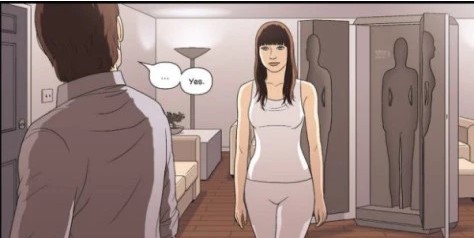
One of the strengths of Alex + Ada is that while Alex serves as the readers’ initial entry point into Luna and Vaughn’s world, he does not remain the sole one. From the beginning, the creators are equally interested in exploring Ada’s experience. Luna’s art emphasizes the lonely aspect of Ada’s day-to-day existence, as she lays alone on the sofa after Alex has gone to work or how she stands still in the house awaiting the moment Alex returns to give her new commands. Alex picking up on these signals, is often awkward around her. He wants to treat her as more than an object or a servant but is repeatedly stifled by her programing. She has no tastes or thoughts of her own, simply parroting back whatever he prefers. He can find no satisfaction in this type of relationship which clearly does not factor in Ada’s own well-being. In such a way, Luna and Vaughn make Alex’s decision to illegally grant Ada sentience not only believable, but desirable.
Once Ada has gained freewill, her personality comes into stronger focus. She shows a newfound enthusiasm for her surroundings wanting to experience everything from the fuzzy warmth of fresh towels to the “pungent” odor of Alex’s dirty socks. At the same, some of the hesitation between human and android fall away, though only gradually. It is to Luna and Vaughn’s credit that they do not rush the romance between their protagonists. It develops naturally with an ebb and flow that is recognizable. Alex struggles to put himself in Ada’s shoes, understanding her blossoming needs, while Ada for her parts does her best to understand exactly for what she wishes. To be with Alex? To explore the world and discover new experiences? At the heart of the narrative are a series of questions about the self which will be familiar to any reader.

Sadly what will also be recognizable to readers is a strong undercurrent of prejudice that runs throughout society. A year earlier, the first artificial intelligence awoke. P-011 uploaded itself into almost a hundred warehouse robots, killing thirty-four humans before being deactivated. These events created a lasting climate of fear around robots, as no one knew when or if the next attack might occur. The government responded by passing sweeping anti-A.I. measures outlawing robot sentience of any kind. Yet, even with these drastic statutes in place, many remain nervous at the sight of a robot. Alex’s next door neighbor berates him for placing the entire neighborhood at risk. Luna and Vaughn wisely leave P-011’s motivations as unknowable as those of many a human mass murderer. What is clear though is that despite the lack of any attacks since then, the fear has only grown. And when fear increases, so does hate.
One of the intriguing aspects of Alex + Ada is how the circumstances of robots have more than one allegory. Another of Alex’s neighbors begins a conversation by offering sympathy, yet his train of thought soon reveals his own bias. An owner of the previous model of the android, he wants some feedback on Ada’s performance before upgrading. While Ada stands right there, he asks Alex about how she is in bed, whether she “gives back” and if Alex might be interested in lending her out for a “ride.” This type of dehumanization, shows how some people may view robots as harmless because they are nothing more than expensive toys. Part of the robots’ rights movement is not simply securing their own safety but also the ability to determine their own identity. In one scene, robots discuss how some alter their given physical appearance, or manufactured gender. Some prefer an androgynous body, feeling little connection to human classifications of gender. In the end, they want what every other oppressed group has ever struggled for: the freedom to be themselves and pursue their dreams.
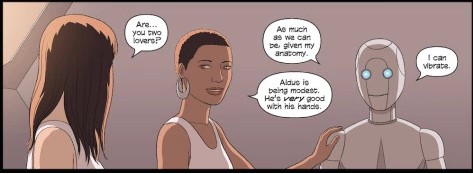
Vaughn co wrote Alex +Ada with Luna, but was the sole author of her next project, “Ruined” which was serialized in the digital comic Fresh Romance. Fresh Romance is an anthology series focused, as its name suggests, on romance stories often mixed with genre elements. “Ruined”, an exception to this rule, is a period piece set in the era of Jane Austen. As with Austen’s novels, “Ruined”’s characters leave as much, if not more, unspoken as spoken. Sarah Winifred Searle’s art is full of avoided glances and awkward expressions. The protagonist Catherine has chosen marriage to a somewhat dour young man, Andrew who possesses the remains of a family fortune with the decaying house to go along with it. They clearly did not marry for love, but as an acceptance of the best options left available to them. Andrew himself says as much, when he bids his wife goodnight on the second day of their union.
While this set-up may, like Alex + Ada, suggest many familiar narrative tropes, Vaughn’s execution keeps the emotions fresh. Catherine is a compelling character from the beginning, quickly earning the readers’ sympathy. Vaughn takes her time peeling back the layers of Catherine’s secrets. Before Andrew’s suit of marriage, Catherine was the lover of a certain “H.A.” Catherine possesses an apprehension for how her past will effect her present, especially as her wedding night brings back memories which plunge her into sadness.
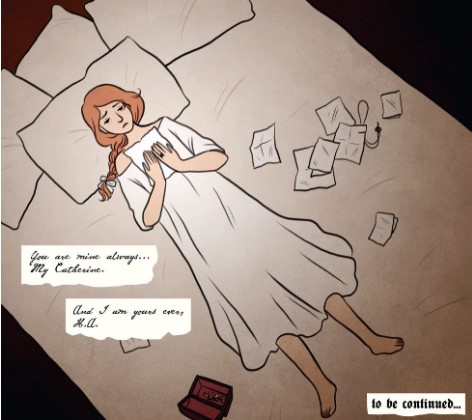
At the same time, though, she does not come off as a “damaged” or “fallen” woman. Catherine does not strike the reader as ashamed of her past, as much as saddened for its loss. In this sense she is different from Jane Austen who despite her strongly rendered female characters, possessed a fairly conventional morality. Vaughn for her part appears to be subverting that traditional outlook while still maintaining much of the charm of Austen’s work. It is an enjoyable blend.
Last year, Alex + Ada wrapped, as planned, with #15. In October “Ruined” concluded the first part of its narrative. Fresh Romance has been absent for a couple months now, but hopefully, it will return with further installments of Vaughn’s story. She has proven herself well suited for spinning tales of unconventional figures such as Ada and Catherine and I look forward to seeing what she writes next.





